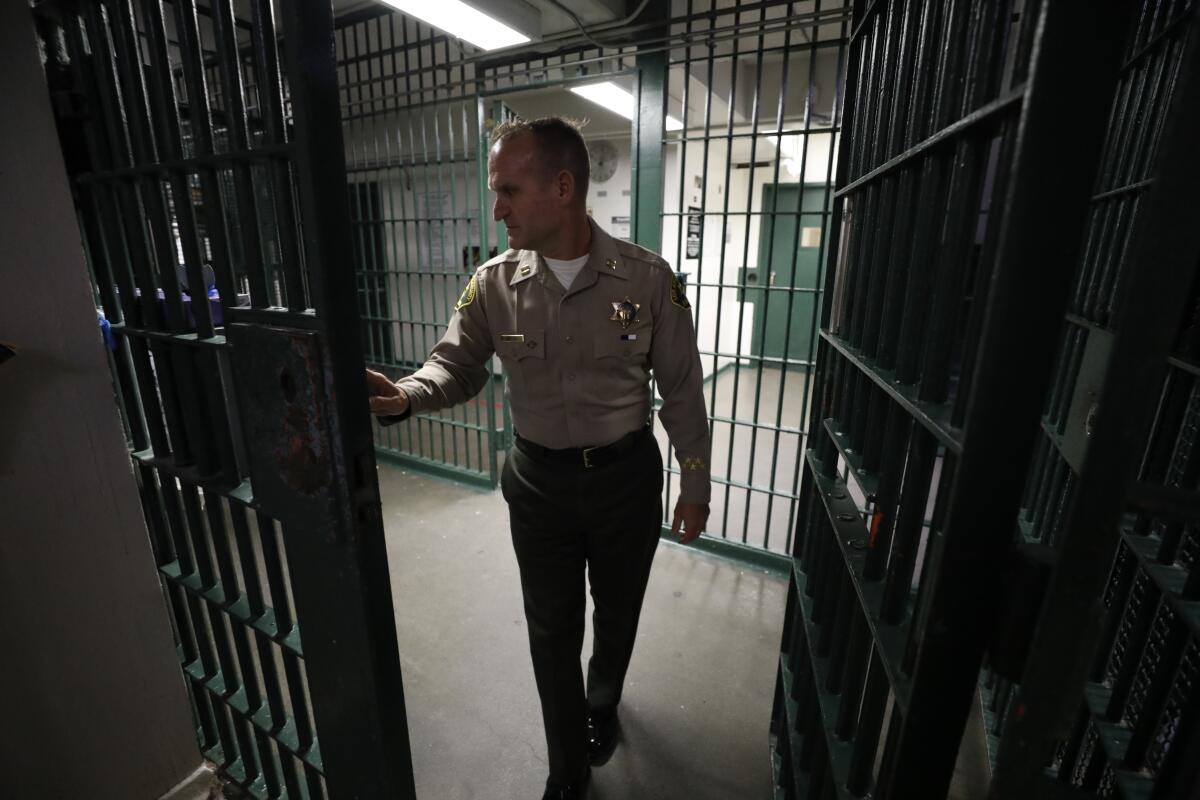More L.A. County jail inmates released over fears of coronavirus outbreak

Law enforcement officials speeded up efforts to release inmates from Los Angeles County jails over fears a coronavirus outbreak could afflict scores of individuals and strain the overburdened system.
The Los Angeles County Sheriff’s Department has reduced its inmate population by 6% in the last three weeks and Dist. Atty Jackie Lacey said her office will consider reducing bail for thousands of nonviolent offenders.
As of Thursday morning, there were no confirmed cases of the virus inside L.A. County jails, where the number of inmates was down to 16,017 inmates from 17,076 on Feb. 28.
“We anticipate the count is going to go further down,” said Cmdr. Jason Wolak of the Sheriff’s Department’s Custody Division. “The reason why we’re doing it is so we can have flexibility in the jail in case we’re going to lose a part of it.”
The county’s sprawling jail system is the largest in the nation, and many civil rights groups and others have pushed to reduce incarceration levels to prevent lockups from becoming breeding grounds for spread of the virus.
Nine inmates were in isolation and getting tested for the virus at the Correctional Treatment Center, where everyone must get his temperature scanned before entering, Wolak said. Elsewhere, 109 more inmates were being quarantined.
Since public visitation has been suspended, inmates are being offered two five-minute phone calls per week for free, Wolak said. Wolak said the Sheriff’s Department is regularly hosting town halls for inmates, advising them about social distancing and to wash their hands, while also distributing more cleaning supplies.
Sheriff Alex Villanueva said earlier this week that he was speeding up the release of inmates with less than 30 days of jail time left to serve, and citing, instead of arresting, people whose alleged offenses carry a bail of less than $50,000. That doesn’t include people suspected of domestic violence.
The Sheriff’s Department is now also looking at potentially releasing pregnant women and older adults at a higher risk for contracting the virus, Wolak said.
Lacey said Thursday that her office will consider, case by case, reducing the bail of 2,000 pretrial inmates the Sheriff’s Department has identified as nonviolent offenders. It was unclear what criteria were used to identify the inmates, but the department was expected to provide her office a list on Friday, she said.
Lacey said her office would also conduct its own review of cases coming up for trial in the next 30 days to identify defendants who could be released on their own recognizance. A judge would have to approve any bail modifications.
“We’re looking for cases where no one was hurt, there was nobody threatened to be hurt, they don’t have anything in their prior record that indicates they’re capable of violence,” she said.
Starting next week, Lacey said, she hopes the courts will be able to get through 300 bail hearings a day, some of which will be conducted by phone.
Robin Steinberg, chief executive of The Bail Project, called on Villanueva and Lacey to work to immediately release any defendants who are being held solely because they cannot pay their bail, unless that person has been deemed a danger to the public.
“We’re really thinking about this as these are our community members and we can’t leave these people behind as California braces for the full scale of this pandemic,” she said. “Policing has to radically change in response to this crisis that we’re facing and the police should refrain from arresting people on the kinds of offenses that they have all too easily arrested people on over the last few decades. It’s an opportunity for them to only make an arrest when absolutely necessary.”
Times staff writer James Queally contributed to this report.
More to Read
Sign up for Essential California
The most important California stories and recommendations in your inbox every morning.
You may occasionally receive promotional content from the Los Angeles Times.










